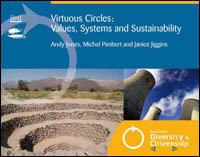Virtuous circles : values, systems, sustainability

Organization(s):
There are two principles here, both reflecting the natural world. The first is that natural systems are based on cycles, for example water, nitrogen and carbon. Secondly, there is very little waste in natural systems. The waste from one species is food for another, or is converted into a useful form by natural processes and cycles.This book shows how these principles can be used to create systems and settlements that provide food, energy and water without consuming large quantities of fossil fuels and other finite resources. In the process, greenhouse gas emissions and environmental pollution are minimised whilst human well being, food and livelihood security, and democratic control are enhanced. This book paints a picture of an alternative future: sustainable and fair systems for the provision of food, energy, fibre and textiles, housing and water that are environmentally benign and involve positive interventions in natural cycles. While their environmental impacts are negligible, non-existent or positive, their socio-economic benefits are multiple and significant.
Monographic Series:
Includes bibliographic references. The book is an output of a project known as Designing Resilience, and documents the initial findings from the first phase of Designing Resilience within the Latin America and Caribbean region.
Keywords:
Broad subject:
Call number:
Record updated: 2022/05/24
